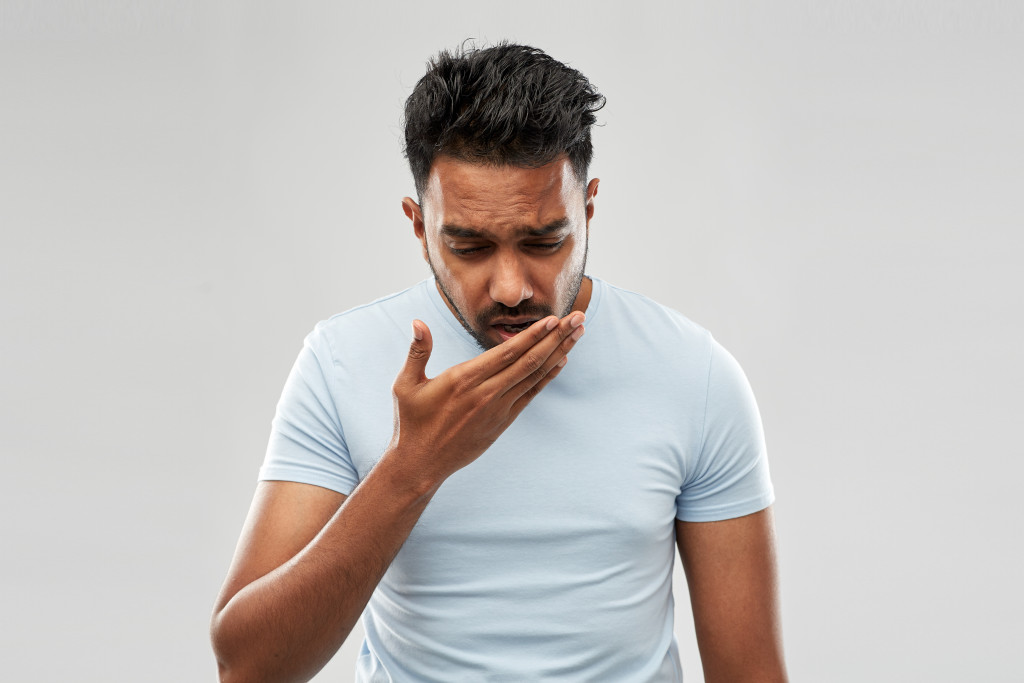- Poor oral hygiene can cause bad breath due to bacteria buildup in the mouth.
- A dry mouth caused by dehydration or medications can also lead to bad breath.
- Smoking and eating certain foods, such as garlic and onions, can cause bad breath.
- Persistent bad breath may indicate an underlying medical condition, so it is essential to consult a doctor if needed.
Bad breath, also known as halitosis, is a surprisingly common problem that can cause embarrassment and social discomfort. The good news is that you can take several simple steps to identify and treat the causes of bad breath. This article will look at five common causes of bad breath and how you can deal with them effectively.
1. Poor Oral Hygiene
The most common cause of bad breath is poor oral hygiene. Bacteria build up on your teeth, gums, tongue, and throat when they aren’t regularly cleaned away by brushing or flossing. The bacteria break down food particles which produce smelly toxins that leave a foul odor in your mouth. To prevent this from occurring, make sure you brush your teeth twice daily and floss every day. Also, utilizing professional teeth cleaning from a dentist twice per year is recommended. This will ensure that the bacteria are completely removed from your mouth to prevent bad breath.
2. Dry Mouth
Saliva helps to keep our mouths clean by washing away food particles that can cause bad breath. If your mouth is dry due to dehydration or medication, there won’t be enough saliva present in the mouth to do its job correctly. To combat this problem, ensure you are drinking plenty of water throughout the day and avoiding sugary drinks, which can contribute to a dry mouth. Additionally, chewing sugar-free gum can help stimulate saliva production and moisten your mouth.
3. Smoking

Smoking is another major contributor to bad breath, as it coats your teeth, gums, and tongue with a sticky residue that traps bacteria and gives off an unpleasant odor. The best way to treat bad breath is to quit smoking altogether. If you find this too difficult, try reducing the number of cigarettes you smoke daily or switching to an e-cigarette. Both of these steps will help improve the smell of your breath. Additionally, you should be sure to brush and floss your teeth regularly to eliminate any lingering odor from smoking.
4. Certain Foods
Certain foods such as garlic and onions can cause bad breath due to their strong odors, which linger in your mouth even after they have been digested. Avoiding these types of food will help minimize the problem, but if you do eat them, it’s essential to brush your teeth afterward so that the odor doesn’t linger for longer than necessary. Additionally, drinking plenty of water after meals will help rinse some odors.
5. Medical Conditions
In some cases, bad breath may be caused by a medical condition such as sinusitis, diabetes, or even some types of cancer. Suppose you are experiencing bad breath, which is not caused by any of the abovementioned issues. In that case, it’s a good idea to visit your doctor to rule out any severe underlying medical conditions. Your doctor can also help you to identify the cause of the bad breath and suggest treatments or remedies. The earlier you seek medical advice, the more likely a successful treatment can be found.
Commonly Asked Questions
How do I know if I have bad breath?

The most reliable way to determine if you have bad breath is to ask a trusted friend or family member. You can also lick the inside of your wrist, wait 15 seconds, then smell it; this will indicate how your breath smells.
Is bad breath just an annoyance, or is it a sign of something more serious?
The causes of bad breath vary and can range from annoying to concerning. Food, drinks, certain medications, poor dental hygiene, or smoking can often cause bad breath. On the other hand, persistent bad breath could indicate a medical condition such as sinusitis or gastroesophageal reflux disease (GERD). You may want to consult a doctor if you have consistently bad breath that isn’t remedied with brushing and flossing your teeth regularly.
How can I treat bad breath caused by food and drinks?
You can get rid of bad breath after meals or snacking by brushing your teeth or using a tongue scraper for more thorough cleaning. Drinking green tea or chewing sugar-free gum is also effective in freshening your breath.
What specific medical conditions cause bad breath?
Several medical conditions can lead to bad breath, such as sinus infections, diabetes, kidney or liver failure, dry mouth (xerostomia), and acid reflux. If your bad breath persists despite regular oral hygiene and lifestyle changes, it is best to consult a doctor for proper diagnosis and treatment.
To Wrap It Up
Bad breath can be an embarrassing issue but can also be easily treated. By practicing good oral hygiene and avoiding certain foods, you can minimize the problem. If your bad breath persists, it’s essential to consult a doctor to rule out any underlying medical conditions. With the right approach, you should be able to keep your breath fresh and clean!






